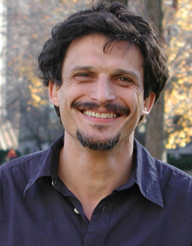非常抱歉,
你要访问的页面不存在,
非常抱歉,
你要访问的页面不存在,
非常抱歉,
你要访问的页面不存在,
验证码:

职称:Chair, Department of Statistics Professor, Departments of Statistics, Computer Science, and the College
所属学校:University of Chicago
所属院系:Department of Statistics
所属专业:Statistics, General
联系方式:773.702.2568
A primary goal of computer vision is to develop algorithms that can learn representations of objects from training sets and subsequently label digital images with instances of these objects. The main focus of my research is the formulation of statistical models for objects. Although not extensively used in computer vision these emerge as a powerful tool in developing recognition algorithms which allow for proper modeling of object and data variability. The simplicity and transparency of the statistical models enables training with small samples, and give rise to efficient computational methods. Models for individual objects can be composed to create models for entire scenes. The models have been implemented in concrete applications such as reading license plates on photos of cars, reading handwritten zipcodes, detecting faces, cars or various objects of interest in biological images and videos. I am also interested in importing ideas developed in computer vision into the domain of speech recognition. Although the speech recognition is a more mature field of research than vision, there are some interesting insights from vision that may contribute to increased robustness and stability of speech recognition algorithms. Research in object recognition in vision and speech naturally raises questions about the relation between the computer algorithms and biological processing in the cortex. After all the our cortex performs these tasks far better than any computer algorithm. Can the computer algorithms be implemented in a biologically plausible neural network and can they contribute to generating hypotheses on how the visual cortex processes input? Can information gleaned about how cortex processes the acoustic and visual input contribute to improving the computer algorithms? I am also interested in other domains of brain function, specifically stochastic models for learning and memory, and encoding and decoding of neurons in the motor cortex.
A primary goal of computer vision is to develop algorithms that can learn representations of objects from training sets and subsequently label digital images with instances of these objects. The main focus of my research is the formulation of statistical models for objects. Although not extensively used in computer vision these emerge as a powerful tool in developing recognition algorithms which allow for proper modeling of object and data variability. The simplicity and transparency of the statistical models enables training with small samples, and give rise to efficient computational methods. Models for individual objects can be composed to create models for entire scenes. The models have been implemented in concrete applications such as reading license plates on photos of cars, reading handwritten zipcodes, detecting faces, cars or various objects of interest in biological images and videos. I am also interested in importing ideas developed in computer vision into the domain of speech recognition. Although the speech recognition is a more mature field of research than vision, there are some interesting insights from vision that may contribute to increased robustness and stability of speech recognition algorithms. Research in object recognition in vision and speech naturally raises questions about the relation between the computer algorithms and biological processing in the cortex. After all the our cortex performs these tasks far better than any computer algorithm. Can the computer algorithms be implemented in a biologically plausible neural network and can they contribute to generating hypotheses on how the visual cortex processes input? Can information gleaned about how cortex processes the acoustic and visual input contribute to improving the computer algorithms? I am also interested in other domains of brain function, specifically stochastic models for learning and memory, and encoding and decoding of neurons in the motor cortex.